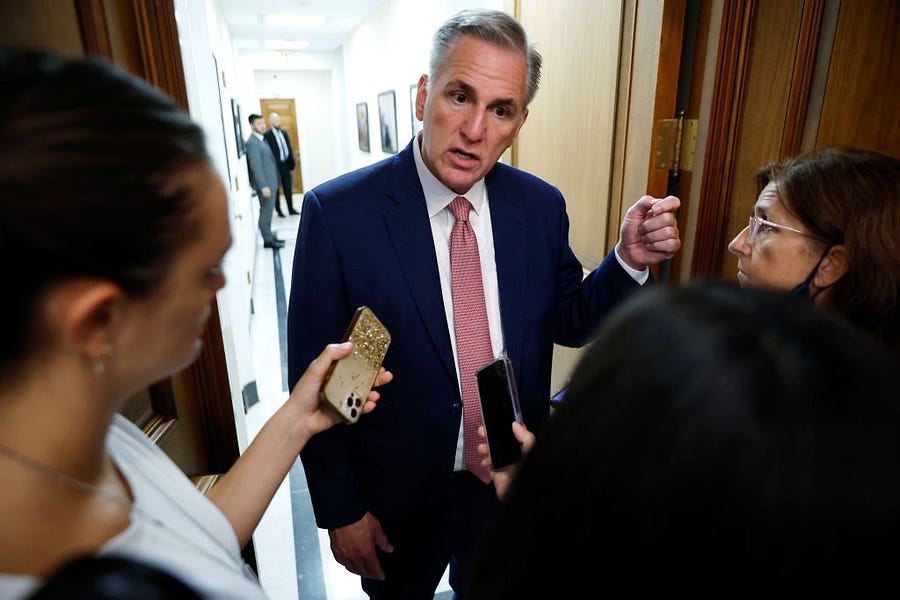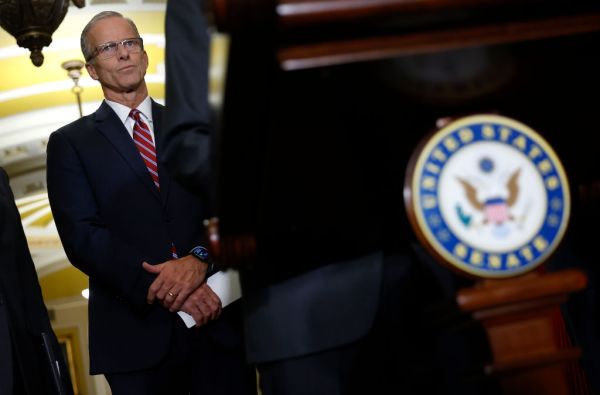Good morning. Congress is well into the depths of August recess—we hope you’re enjoying a few relatively quiet weeks before the shenanigans start up again. My colleagues at The Sweep and The Morning Dispatch already have all things campaign season covered, so be sure to watch those newsletters. One programming note: We don’t plan to publish Uphill on Friday, September 2.
Republicans Consider Conference Dynamics Ahead of Midterms
We’ve written to you several times over the past year and a half about House GOP leader Kevin McCarthy’s lax approach to the far-right faction of his conference. That hasn’t changed. But it is increasingly alarming to some rank-and-file lawmakers who find themselves at odds with the most brash and conspiracy theory-friendly Republicans.
As the November midterm elections draw closer—and after a Democrat won a tight special election in New York last week—some members say they are worried about how the conference will function if the GOP wins only a slim majority in the House.
One House GOP lawmaker who spoke on the condition of anonymity said they are “very concerned about the influence of certain members over the party and its leadership and the direction of our conference after November.”
“The crazies of the party grab headlines and raise money off the small dollar donors. Those whose stunts do nothing for the conservative agenda but do everything to line their campaign pockets,” the Republican told The Dispatch. “Those influencers have undue influence over the party.”
The lawmaker doesn’t expect much from McCarthy: “I don’t bother taking my complaints to him any more because I know it won’t matter.”
Recent polling and last week’s special election in New York—a competitive bellwether district that President Joe Biden carried only by about two points in the 2020 election—have renewed chatter about the dynamics of the House GOP conference and what might happen if their candidates fall short of earlier predictions of a red wave.
The party opposite a sitting president historically has taken the House in the midterm elections. That trend, paired with high inflation and President Joe Biden’s consistently poor approval ratings, has pushed GOP hopes high for a strong showing in November. But recent elections and polling suggests the Supreme Court’s decision sending abortion policy decisions to the states could boost voter turnout on behalf of Democratic candidates instead. It may not be enough to keep the House, but it could cut into Republicans’ margins.
Individual members have more power in a smaller majority, when their votes are more necessary for legislation to pass the chamber. A larger majority, meanwhile, typically means congressional leaders have a stronger hand to guide their conference—and more wiggle room to make deals on major bills (like government funding) without the risk of hardline members punishing them.
GOP leaders have had to weigh the demands of factions like the House Freedom Caucus for years. The group’s tactics led former House Speaker John Boehner to retire in 2015 and complicated former Speaker Paul Ryan’s tenure at the outset of former President Donald Trump’s administration. But the Freedom Caucus of today—known largely for hosting some of Trump’s fiercest defenders—is far removed from its early goals of opening up legislative procedure and cutting government spending. And new Republicans within the conference, such as Rep. Marjorie Taylor Greene, have turned up the temperature, constantly fighting with fellow GOP lawmakers and publicly touting outlandish talking points.
That sect of the conference is only expected to grow larger when the new Congress gavels into session.
“You have a lot of members practicing a whole different brand of politics in a way that didn’t exist just a few short years ago,” Brendan Buck, who previously served as an aide to Boehner and a senior adviser to Ryan, told The Dispatch last year.
Some Republicans are downplaying the potential for political headaches for McCarthy, though.
Rep. Rodney Davis, an Illinois Republican who recently lost his primary to a Trump-backed opponent, told CNN’s Melanie Zanona and Manu Raju in a well-reported piece about conference dynamics that the House GOP will unite behind investigations into the Biden administration.
“The key in this divided government is going to be oversight—and I think a lot of Freedom Caucus members are excited about that prospect,” Davis said. “Government funding can be a headache, depending on what the majority looks like, but keep in mind: Nancy Pelosi was able to keep her very slim majority together in a very polarized environment.”
Republican leaders have already been planning how they will exercise subpoena powers if they win the House. Members are laying the groundwork to investigate the Biden administration’s military withdrawal from Afghanistan, Hunter Biden’s business dealings, and the origins of the coronavirus pandemic.
The Wall Street Journal’s Siobhan Hughes and Tarini Parti previewed the investigative agenda yesterday, writing that McCarthy “has encouraged top Republicans to issue preservation notices and document requests—of which more than 500 have been issued so far—to various government entities to speed up the retrieval of information next year.”
For now House Republicans may keep one eye on upcoming investigations, but they’re keeping the other on the polls.










Please note that we at The Dispatch hold ourselves, our work, and our commenters to a higher standard than other places on the internet. We welcome comments that foster genuine debate or discussion—including comments critical of us or our work—but responses that include ad hominem attacks on fellow Dispatch members or are intended to stoke fear and anger may be moderated.
You are currently using a limited time guest pass and do not have access to commenting. Consider subscribing to join the conversation.
With your membership, you only have the ability to comment on The Morning Dispatch articles. Consider upgrading to join the conversation everywhere.